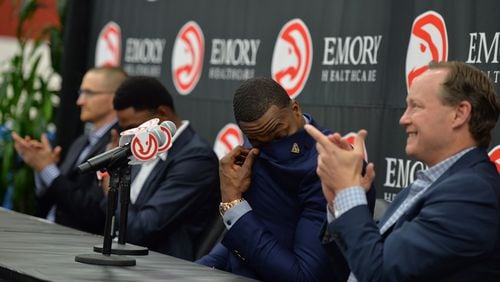It's a sign of how utterly the Dwight Experiment had failed that the kneejerk reaction to any outbound trade was to say, "Finally!" Fact is, Dwight Howard – once known as Superman – was a Hawk for barely 11 months. New fact: He's now on his fifth organization in five calendar years. At 31, the Man of Steel is indispensable to no team.
The Hawks needed him gone in the worst way, and that’s essentially what Tuesday’s trade seems – a deal made to get rid of someone. The Hawks shed a starting (but not always finishing) big man due to make $47.3 million over the next two seasons for a non-starting big man who’ll earn $37.5 million over the three seasons and a sub guard who’ll make $6.3 million next year. And they traded down 10 spots in Round 2 of Thursday’s draft. Whoa, Nellie.
From Kevin Pelton of ESPN Insider: "This trade is far worse than cap-neutral for Atlanta. (Miles) Plumlee's contract is among the league's worst deals … (S)ince the Hawks are taking on the worse contract and the worse players, why are they also trading down in the second round?" For the record, Pelton grades the Hawks' part of the deal a D. He assigns Charlotte an A-minus.
About here, you’re probably saying: If you’re plunging into a rebuild, isn’t the idea to dump players, as opposed to winning games/trades? Well, yes. In the grand scheme, it’s enough to know that the Hawks under new general-management are no longer under the impression that true contention is just a shooter away. Still, you hate to see Travis Schlenk’s first move, even if made for a reason, not bring either cap relief – isn’t “flexibility” among his watchwords? – or a slightly better draft pick.
It’s possible the Hawks still could re-up Paul Millsap for maximum money – possible in the sense that the San Diego Padres could, mathematically speaking, win the 2017 World Series. A new GM doesn’t make the splash move of trading Howard if he’s in Win Now mode. Such short-sighted thinking was what brought Superman home to Atlanta – remember when that was a marketing campaign? – and thrust the previous front office’s liabilities into sharp relief. Mike Budenholzer is a coach but not a personnel guy; Wes Wilcox was the GM but not really. Enter Schlenk from Golden State.
About whom we can say this: He apparently sees what’s what. He sees it so clearly – some of us saw it long ago – that his Job 1 was to undo the biggest move made by Budenholzer as franchise czar. It will be fascinating to see if the coach-and-coach-only is fully vested in Howard’s departure. (Granted, this same coach didn’t play his starting center one minute in the final quarter of an elimination game.)
If Howard's gone, Millsap surely is, too. (Maybe with a sign-and-trade coming, but gone all the same.) Without either, the Hawks are lottery-bound. Not many coaches would be eager to watch a team that played in the Eastern Conference finals 25 months ago dive into deep-sea rebuilding. I say again: I'd be surprised if Budenholzer sticks around long.
Don't misunderstand: The Hawks need to get into the lottery. The downside of making the playoffs 10 years running was never getting a prime pick. (The Hawks' last top 10 draftee – Al Horford at No. 3 in 2007.) They'd run low on talent, young talent especially. The only way to mine young talent is to take your chances with the ping-pong balls. As the 76ers and Celtics have shown , the more lottery picks you have, the better your odds.
The biggest disappointment in this deal is that it brought the Hawks no closer to this year’s lottery. Heck, it cost them the first pick of Round 2, and Schlenk knows better than anyone that Round 2 guys sometimes hit big – Draymond Green, No. 35 overall in 2012. We concede that this was surely the first of many Schlenk trades. Still, Howard was the biggest name the Hawks had under contract. If they couldn’t use him to move upward even a bit, there’s little chance that Kent Bazemore or Taurean Prince or even Dennis Schroder will do the trick.
I’m all for rebuilding. (Or tanking, if you like.) But I'm unclear as to how this trade makes the Hawks any more flexible, which if you’re tanking is the name of the game. I’m not sure Schlenk needed to make this move his first move. Was the market for Miles Plumlee in danger of closing?
I like that the new GM seems to grasp the reality of his new circumstances. I wonder about the execution. This was a great deal only in the sense that the Hawks no longer have to worry about dealing Dwight Howard. Then again, if Schlenk ships Bazemore and Plumlee to New Orleans for Anthony Davis within the next hour, forget I said anything.







